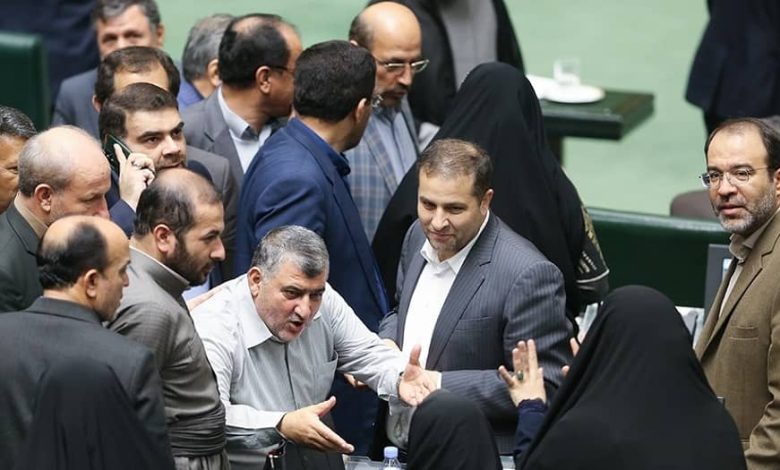How Upcoming Parliamentary Elections Could Weaken Iran’s Regime

iran majlis parliament fight (1)
Written by
Mehdi Oghbai
Throughout its history, elections in the illegitimate clerical regime have been synonymous with crisis due to the re-emergence of conflicting factions and the looming potential for societal upheaval. The latest spectacle, dubbed the parliamentary elections set to commence on March 1, 2024, has managed to not only intensify existing internal disputes within the ruling body but also set the stage for more vulnerability in facing the restive Iranian society.
On August 15, the Iran newspaper, run by the government of Ebrahim Raisi, delivered a stark caution: “All political groups need to exercise caution in avoiding unwittingly falling into the enemy’s traps. The enemy’s agenda revolves around conducting intricate psychological maneuvers targeting both the public and officials, while concurrently striving to generate a multitude of disturbances that give rise to deceptive dichotomies. This approach aims to undermine the strategic pillars of health, security, competition, and participation in the election process.”
During the deceptive parliamentary elections of 2020 and the subsequent presidential sham elections in 2021, Supreme Leader Ali Khamenei strategically sidelined the so-called reformist faction from the competition. This was aimed at solidifying his control and enhancing his capacity to suppress potential uprisings. However, the fear of a low-turnout electoral process and the growing display of internal isolation seem to be prompting Khamenei to seek re-engagement in the political arena.
Despite the inflated figures touted by Raisi’s government through the Ministry of Interior regarding the number of registered candidates for the upcoming elections, the actual scenario portrays a different narrative. Thus far, the call to join the electoral process, either by encouragement or intimidation, has not taken a promising trajectory for the regime.
Highlighting the surge of infighting, the state-run Farhikhtegan newspaper wrote on August 5, “Reformists have two primary considerations. Firstly, they must position themselves as the forefront and emblem of critics and protesters. Secondly, they should strive to bring the protesting faction to the ballot box in the elections. However, this objective contradicts the direct involvement of prominent figures from the left-wing faction in the elections. In such a scenario, the election boycotters would cast the reformist figures in a negative light, leading to misalignment.”
Akbar Aalami, a former member of parliament who was disqualified in the presidential elections, stated in an interview that he believes the efforts of some principlists to form a coalition with a group of reformists are merely aimed at stirring up the election atmosphere.
#Iran News in Brief
In an article entitled “The Qalibaf-elimination Project Kickstarted”, the state-run Eqtesad News shed lights on the regime's factional infighting and how some MPs are paving the way to get rid of the current parliament speaker. Read⬇️https://t.co/I4egGxPSqI pic.twitter.com/li4SCn5gtA— NCRI-FAC (@iran_policy) May 14, 2023
The power struggle is mostly intense and acute among factions referred to as principlists. The state-run newspaper, Etemad, wrote on the same day, “Electoral disagreements are growing seriously… A main division exists between the Paydari Front [faction close to former President Mahmoud Ahmadinejad] and groups close to M.B Qalibaf [parliament speaker]… Furthermore, those in the government and close to Ebrahim Raisi are at play too. In every decision, they pass responsibility to the parliament, but they maintain a covert connection with some elements of the Paydari Front. The common rivalry has bound them together, aiming to remove Qalibaf or weaken his movement in the next parliament… On the other hand, Qalibaf’s supporters are quite active. They must engage in media conflict with the Raisi government on one hand and fight back with the Paydari Front on the other.”
Even differences between Khamenei’s closest allies are evident. Using his paper Farhikhtegan to warn Ebrahim Raisi, Ali Akbar Velayati, the former Foreign Minister and senior advisor to Khamenei, wrote on August 14, “The government uses foreign policy as a means to control inflation and, contrary to some analyses, has maintained the negotiating ground. From exchanging political prisoners as groundwork for tactical nuclear agreements to creating a platform for negotiations with Saudi Arabia driven by China’s regional stability needs. However, the inflation monster cannot be easily tamed. The government has enough time until 2025 to create a defensible record. The social transformations in the fall of 2022 are a present reality. Now, is it rational for an individual or a faction within the government to enter the elections, putting the available opportunities at stake for electoral competition?”
While there are still six months left until the parliamentary sham elections, the cracks and divisions within the regime are becoming more apparent. In past years, electoral competitions, debates, and the revelations candidates used to undermine their rivals have fueled social anger. This anger was demonstrated in the uprisings of 2009, 2017, 2019, and 2022.
In the revolutionary context of Iran, various authorities and factions within the regime will escalate their efforts to gain power and steer a fractured state in the direction they believe is best equipped for its preservation. However, the people who have cast their votes on the streets will draw only one conclusion from these competitions.

